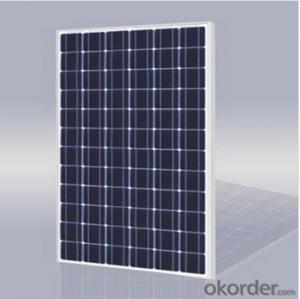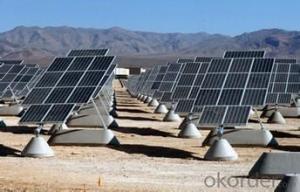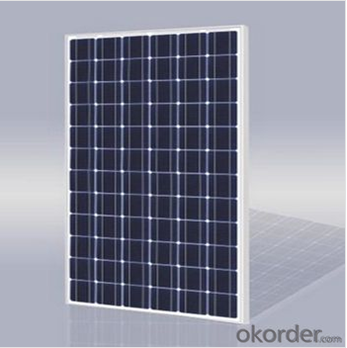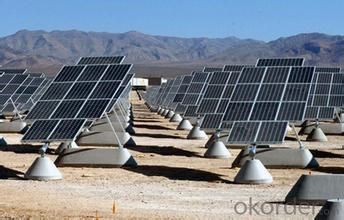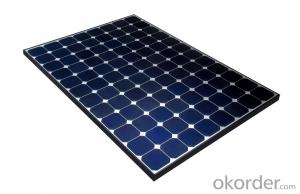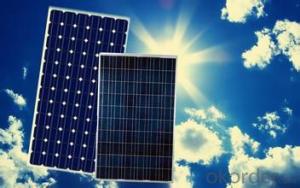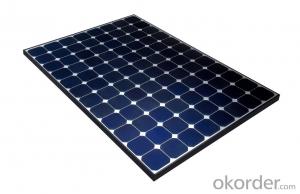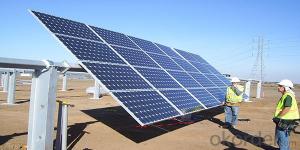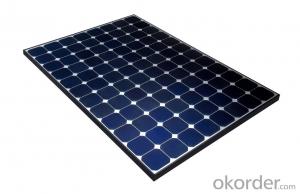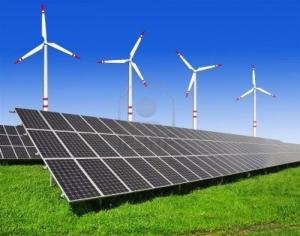Home Solar Energy Systems:130kw CNBM Monocrystalline Silicon Panel for Home Use
- Loading Port:
- Tianjin
- Payment Terms:
- TT OR LC
- Min Order Qty:
- 50 watt
- Supply Capability:
- 1000 watt/month
OKorder Service Pledge
OKorder Financial Service
You Might Also Like
Specification
130KW CNBM Monocrystalline Silicon Panel for Home Using
Production description
Off-the-grid homes are autonomous; they do not rely on municipal water supply, sewer, natural gas, electrical power grid, or similar utility house in the high-desert wilderness of Northern Arizona, collecting rainwater, composting waste, and paying nothing for utilities.[4][5]
The large magnitude of solar energy available makes it a highly appealing source of electricity. The United Nations Development Programme in its 2000 World Energy Assessment found that the annual potential of solar energy was 1,575–49,387 exajoules (EJ). This is several times larger than the total world energy consumption, which was 559.8 EJ in 2012.
Electrical power can be generated on-site with renewable energy sources such as solar (particularly with photovoltaics), wind, micro hydro, geothermal; with agenerator or Micro combined heat and power with adequate fuel reserves. Such a system is called a stand-alone power system. In addition, it is possible to simply eliminate electric power such as in Old Order Amish and Old Order Mennonite communities.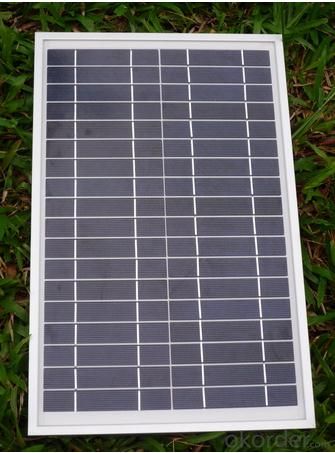
Feature
1.High conversion efficiencies resulting in superior power output performance.
2.Outstanding power output even in low light or high temperature conditions
3.Optimized design for ease of soldering and lamination
Physical characteristic
1. Rigorous quality control meets the highest international standards.
2. High-transmissivity low-iron tempered glass, strong aluminium frame.
3. Using UV-resistant silicon.
4. IS09001/14001/CE/TUV/UL
Packaging
26pcs in one carton 6pallets in 20foot container 14pallets in 40 foot container.
- Q: How do I maintain and clean my solar energy system?
- To ensure the proper maintenance and cleanliness of your solar energy system, it is crucial to adhere to several important steps: 1. Conduct Regular Inspections: It is important to regularly inspect your solar panels to ensure they remain in optimal condition. Look out for any indications of damage, such as cracks or loose connections. Additionally, check for the accumulation of debris or leaves on the panels. 2. Periodic Cleaning: Cleaning your solar panels on a regular basis is necessary to maintain their efficiency. Begin by removing any loose debris, including leaves or dirt, using a soft brush or a leaf blower. Next, gently scrub the panels with a mixture of mild soap and water, using a non-abrasive sponge or cloth. Avoid the use of harsh chemicals or abrasive materials that may harm the panels. 3. Prioritize Safety: Always prioritize safety when engaging in solar panel cleaning. Before commencing any maintenance work, ensure that you turn off the system and disconnect it from the electrical grid. If your solar panels are installed on the roof, utilize appropriate safety equipment, such as a harness or ladder, to prevent accidents. 4. Seek Professional Assistance: It is advisable to schedule professional maintenance at least once annually. Professional technicians possess the necessary expertise and tools to identify potential issues, conduct comprehensive inspections, and perform any required repairs. This ensures that your solar energy system operates optimally. 5. Regularly Monitor Performance: It is essential to regularly monitor the performance of your solar energy system. Many solar inverters come equipped with monitoring systems that enable you to track energy production. This enables you to promptly address any decrease in efficiency. 6. Address Shading: Trim any trees or shrubs that may cast shade on your solar panels on a regular basis. Shading can significantly diminish the efficiency of your system, so it is crucial to ensure that your panels receive maximum sunlight. By adhering to these maintenance and cleaning practices, you can ensure that your solar energy system remains in optimal condition, thereby maximizing its efficiency and lifespan.
- Q: What is the role of solar energy forecasting in grid integration?
- The role of solar energy forecasting in grid integration is vital for effectively managing the integration of solar power into the electrical grid. Solar energy forecasting provides accurate predictions of solar power generation, enabling grid operators and energy market participants to plan and optimize the operation of the grid. Solar energy is intermittent and variable, as it depends on weather conditions and the position of the sun. Therefore, accurate forecasting of solar power generation helps grid operators to anticipate fluctuations in solar energy supply and plan for potential imbalances between supply and demand. Grid integration of solar energy requires balancing the variability of solar power generation with the overall electricity demand. Solar energy forecasting plays a critical role in this process by providing real-time predictions of solar output, allowing grid operators to adjust other sources of power generation or storage to maintain grid stability. Moreover, solar energy forecasting is essential for the effective utilization of solar power in energy markets. Accurate forecasts enable energy market participants to optimize their trading strategies, determine the optimal dispatch of power generation assets, and manage their portfolio effectively. This helps to reduce the cost of integrating solar energy into the grid and enhances the overall economics of renewable energy. Additionally, solar energy forecasting contributes to the efficient operation of grid infrastructure. By providing accurate predictions of solar power generation, grid operators can plan the deployment and operation of transmission and distribution infrastructure, ensuring that it can handle the increasing penetration of solar energy without compromising grid reliability. Overall, solar energy forecasting plays a crucial role in grid integration by providing accurate predictions of solar power generation, allowing grid operators and energy market participants to effectively manage the integration of solar energy into the electrical grid, optimize energy trading strategies, maintain grid stability, and efficiently operate grid infrastructure.
- Q: Are there any risks of electrical shocks during installation or maintenance of solar energy systems?
- Yes, there are risks of electrical shocks during the installation or maintenance of solar energy systems. Solar energy systems involve working with electrical components, including solar panels, inverters, and batteries, which can carry high voltage. If proper safety measures are not followed, it is possible to come into contact with live electrical parts and receive an electrical shock. Some common risks that can lead to electrical shocks include improper installation, inadequate training or knowledge of electrical systems, failure to use personal protective equipment (PPE), and lack of proper grounding. When installing or maintaining solar energy systems, it is crucial to follow safety guidelines and regulations, such as wearing insulated gloves, using insulated tools, and ensuring that the system is properly grounded. Additionally, working at heights during installation or maintenance poses an additional risk of electrical shocks. It is important to exercise caution to prevent falls or accidental contact with live electrical parts while working on rooftops or elevated areas. To mitigate the risks of electrical shocks, it is recommended to hire qualified and trained professionals for the installation and maintenance of solar energy systems. Regular inspections and maintenance checks should also be conducted to identify and address any potential electrical hazards. Overall, while solar energy systems offer numerous benefits, it is essential to be aware of the potential risks of electrical shocks and take necessary precautions to ensure the safety of individuals involved in the installation or maintenance process.
- Q: Can solar energy systems be used for transportation?
- Yes, solar energy systems can be used for transportation. Solar energy can be harnessed to power different types of vehicles, including cars, buses, boats, and even airplanes. Solar-powered vehicles use photovoltaic (PV) cells to convert sunlight into electricity, which can then be stored in batteries or used directly to power the vehicle's electric motor. Solar panels can be installed on the roof, hood, or any other suitable surface of the vehicle to capture sunlight and generate electricity. While solar-powered transportation is still relatively limited in terms of range and speed compared to traditional fossil fuel-powered vehicles, advancements in solar technology are continuously improving the efficiency and performance of these systems. Furthermore, solar energy can also be utilized in transportation infrastructure, such as solar-powered charging stations for electric vehicles, providing a sustainable and renewable alternative to traditional energy sources.
- Q: How much space is needed for a solar energy system?
- The amount of space needed for a solar energy system can vary depending on several factors, including the size of the system and the efficiency of the solar panels. On average, a small residential solar system may require around 100-400 square feet of available roof space, while a larger commercial system could require several thousand square feet or even acres of land. It is important to consider factors such as shading, orientation, and local regulations when determining the space requirements for a solar energy system.
- Q: Can solar energy systems be used in areas with limited grid infrastructure?
- Yes, solar energy systems can be used in areas with limited grid infrastructure. Solar energy systems are particularly suitable for off-grid or remote areas where it may be challenging or costly to extend the existing electrical grid. These systems can provide a reliable and sustainable source of electricity, reducing dependence on traditional grid infrastructure and fossil fuels.
- Q: What is the impact of bird droppings on the performance of solar panels?
- Bird droppings can have a negative impact on the performance of solar panels. When bird droppings accumulate on the surface of the panels, they can create a film that reduces the amount of sunlight reaching the photovoltaic cells. This can lead to a decrease in the overall energy production of the panels. Additionally, bird droppings can also cause shading and create hotspots on the panels, further affecting their efficiency. Regular cleaning and maintenance of solar panels are necessary to minimize the impact of bird droppings and ensure optimal performance.
- Q: Are there any tax benefits for installing a solar energy system?
- Installing a solar energy system comes with numerous tax benefits. One significant benefit is the federal investment tax credit (ITC), which permits individuals and businesses to deduct a percentage of their solar energy system's cost from their federal taxes. As of 2021, the ITC offers a 26% tax credit for residential and commercial systems. Moreover, some states provide their own tax incentives for solar energy installations. These incentives may encompass exemptions from property taxes, sales taxes, or state tax credits. The availability and extent of these incentives differ from state to state, necessitating thorough research into the specific incentives offered in your region. Furthermore, the installation of a solar energy system can enhance your property's value. Numerous studies have demonstrated that homes equipped with solar panels yield a higher selling price compared to those without. This boost in property value can yield long-term financial advantages. To fully comprehend and capitalize on all the tax benefits associated with installing a solar energy system, it is advisable to consult a tax professional or a solar energy expert.
- Q: How much energy can a solar energy system generate?
- The amount of energy a solar energy system can generate depends on various factors such as the size and efficiency of the system, the amount of sunlight available, and the location of the system. On average, a well-designed solar energy system can generate enough electricity to power a significant portion of a household's energy needs. However, larger systems or those installed in areas with abundant sunlight can generate even more energy, potentially allowing for surplus energy to be fed back into the grid.
- Q: Can solar energy systems be used for powering telecommunications networks?
- Yes, solar energy systems can be used to power telecommunications networks. Solar panels can generate electricity from sunlight, which can be stored in batteries or used directly to power telecom equipment. This renewable energy source is particularly suitable for remote or off-grid locations where it may be costly or impractical to connect to the electrical grid. Additionally, solar energy systems can help reduce operational costs and carbon footprint associated with traditional power sources.
Send your message to us
Home Solar Energy Systems:130kw CNBM Monocrystalline Silicon Panel for Home Use
- Loading Port:
- Tianjin
- Payment Terms:
- TT OR LC
- Min Order Qty:
- 50 watt
- Supply Capability:
- 1000 watt/month
OKorder Service Pledge
OKorder Financial Service
Similar products
Hot products
Hot Searches
Related keywords
